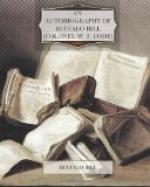I wheeled at the order, and recognized his two captives as the men I was looking for, a pair of horse-thieves and murderers whom I had been sent to apprehend. My revolvers were put into instant requisition, and I kept them covered while White removed the guns with which they had expected to put me out of their way.
With White’s help I conducted these gentlemen forty miles back to the sheriff’s office, and they walked every step of the way. Each of them got ten years in the penitentiary as soon as they could be tried. They either forgave me or forgot me when they got out, for I never heard of either of them again.
In the campaign of 1876 I secured employment for White as a scout. He was with me when Terry and Crook’s commands separated on the Yellowstone. By this time he had come to copy my gait, my dress, my speech, and even my fashion of wearing my hair down on my shoulders, though mine at that time was brown, and his was white as the driven snow.
We were making a raid on an Indian village, which was peopled with very lively and very belligerent savages. I had given White an old red-lined coat, one which I had worn conspicuously in a number of battles, and which the Indians had marked as a special target on that account.
A party of Indians had been driven from among the lodges into a narrow gorge, and some of the soldiers, among them Captain Charles King, had gone after them. As they were proceeding cautiously, keeping tinder cover as much as possible, King observed White creeping along the opposite bluff, rifle in hand, looking for a chance at the savages huddled below, and hoping to distract their fire so they would do as little damage as possible to the soldiers who were closing in on them.
White crawled along on all-fours till he reached a stunted tree on the brim of the ravine. There he halted, brought his rifle to his shoulder in readiness to aim and raised himself slowly to his feet. He was about to fire, when one of the Indians in the hole below spotted the red-lined coat. There was a crack, a puff of smoke, and White toppled over, with a bullet through his heart. The coat had caught the attention of the savages, and thus I had been the innocent means of my friend’s death; for, with the soldiers pressing them so hard, it is not likely that any of the warriors would have wasted a shot had they not thought they were getting Pa-ho-has-ka. For a long time the Indians believed that I would be a menace to them no more. But they discovered their mistake later, and I sent a good many of them to the Happy Hunting-Grounds as a sort of tribute to my friend.
Poor old White! A more faithful man never took a trail, nor a braver. He was a credit to me, and to the name which General Sheridan had first given him in derision, but which afterward became an honor, the name of “Buffalo Chips.”
When Terry and Crook’s commands joined on the Yellowstone both commands went into camp together and guards were placed to prevent surprise. The scene was typical of the Old West, but it would astonish anyone whose whole idea of warfare has been gained by a visit to a modern military post or training camp, or the vast camps where the reserve forces are drilled and equipped for the great European war.




